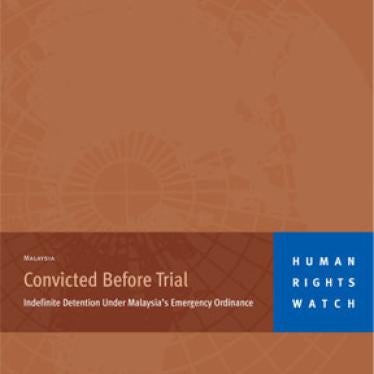(Kuala Lumpur) - The Malaysian government is holding more than 700 criminal suspects indefinitely without trial or charge under the Emergency Ordinance, Human Rights Watch said in a report released today. The Malaysian parliament should repeal this law and instead rely on the country’s criminal law to prosecute ordinary criminal offenses.
The 35-page report, “Convicted Before Trial: Indefinite Detention Under Malaysia’s Emergency Ordinance,” documents how the Malaysian government has detained criminal suspects indefinitely without charge or trial, subjected them to beatings and ill treatment while in detention, and rearrested them upon court-ordered release.
The Emergency Ordinance was enacted in 1969 as a “temporary measure” to respond to ethnic riots. But for nearly four decades the government has used the law to detain criminal suspects without trial for lengthy periods when it finds it difficult to prosecute them.
“Emergency Ordinance detainees live in a world of uncertainty, never knowing when they will be released,” said Sahr MuhammedAlly, researcher in the Asia division of Human Rights Watch and author of the report. “Once released, there is no guarantee that they will not be rearrested and detained for the same alleged offense. This practice must end.”
Emergency Ordinance detainees are held at Simpang Renggam detention center in Johor in inhumane and degrading conditions. Former detainees told Human Rights Watch about the overcrowded cells, poor hygiene, inadequate light and ventilation, and inedible food at Simpang Renggam. After visiting the detention center, the Malaysian Bar Council and the Parliamentary Caucus on Human Rights similarly concluded that conditions in Simpang Renggam were overcrowded and congested.
By law, Emergency Ordinance detainees are denied the ability to challenge the merits of their detention and are limited to court review of the procedural grounds for detention. The government, however, fails to respect court orders when procedural challenges are successful, and often rearrests detainees after they are released. In June, the Malaysian press reported that the police rearrested 11 Emergency Ordinance detainees as the detainees attempted to walk out of the Simpang Renggam detention center after their release.
Some criminal suspects are detained under the Emergency Ordinance after having initially been detained under successive pretrial detention orders. Although Malaysian criminal procedure code allows pretrial detention for only 15 days, the police – in a practice referred to as “chain-smoking orders” or “road shows” – obtain successive remand orders for a suspect from different judges and jurisdictions for alleged involvement in different cases in order to continue detaining a suspect. Having failed to collect evidence to charge a suspect, the police then seek an Emergency Ordinance order to continue detention of a suspect for an additional 60 days and then up to two years.
“It is a fundamental principle that guilt or innocence must be decided by an independent court, not by executive fiat,” said MuhammedAlly. “Malaysia must repeal the Emergency Ordinance and use the normal criminal law to try suspected criminals.”
Last year, the government-appointed Royal Commission to Enhance the Royal Malaysia Police recommended the repeal of the Emergency Ordinance, concluding that, “it had outlived its purpose and violated the right to liberty.” But the Malaysian government has given no indication that it will repeal this draconian law.
“The government should listen to its own commission and repeal this draconian and outdated law,” said MuhammedAlly. “Otherwise, the country’s claim that it operates on the rule of law will be exposed as nothing more than a pretense.”





